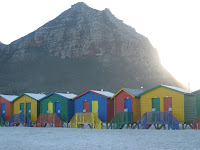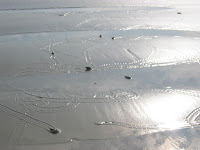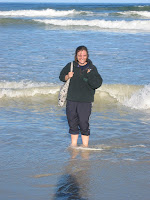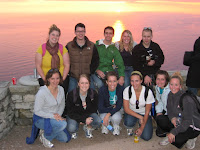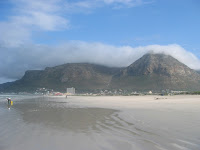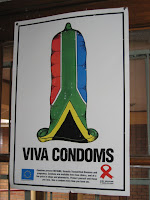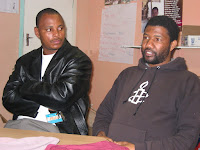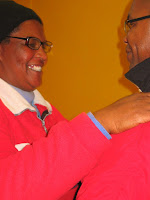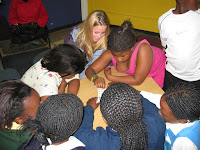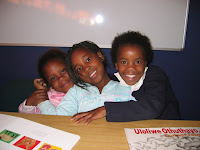Children in the township both broke my heart and saved my sanity. Being a mother and someone whose own mother spent her entire career concerned with the welfare of children, and also being an educator myself I was particularly interested in what the life of these kids would be like. I learned a lot. What to do with this knowledge is my next challenge.
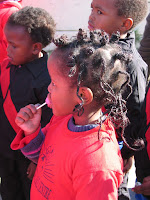
There were children of all ages everywhere: at church, playing in the streets (they have no yards), walking to school, hamming it up for pictures. They had lots of energy and were really excited to see white people. Edwin told us some of them may never have seen white people before. Ben was called “mlunga” (mah-LOON-guh) by some, which was simply “white guy.” All of us really enjoyed taking pictures of the kids, then showing them the digital camera screen and seeing them squeal even louder when they saw themselves in the picture. Ben had video and that was almost more than they could stand as they’d jump up and down while watching.
We spent some time at the Stormount school and saw kids playing soccer with a ball made from a condom they had blown up and filled with plastic shopping bags. We returned the next day with a real soccer ball (I believe this was Ben’s idea) and they were extremely excited and played right away with Ben (and smoked him with their moves a few times!). I noticed girls were not playing and asked Johanna, our township guide, if girls played soccer. She said they play “net ball” (basketball) and I felt sad that we hadn’t brought them a ball, but then there was no net. And we had already brought school supplies. Seems the needs are endless.
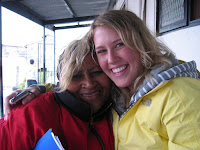
Johanna (at left with Brittney, pretending she has blonde hair) is a great story too. She quit her job as a cleaning lady a while back because she was having pain from the manual work (not sure her age but I’d say in her early 60s?). She came to JL Zwane and started a home visit program, meeting with old ladies and sometimes with orphans. She brings food when she can, prays with them, basically makes their day, and brings news about their condition back to the community center. But Johanna herself is living day to day. She is a volunteer. She has no income, so they feed her for the work that she does. She talked about the apartheid days and how hard they were, and how she attempts to keep from getting angry. Her incredible faith in God is what keeps her going. I had a hard time wondering how God allowed this to happen to her and all the others we met. (Ironic in so many ways that I was reading “The Shack” while in Guguletu – a book where a man meets God in a wooden shack in the woods and God explains why bad things happen to people.)
We often gave out dum-dum suckers to kids and got big smiles for that too. Not sure if this was appropriate: giving candy to kids who might not have had breakfast, and might not be getting dinner when they get home.
Home life is hard enough with the living conditions I’ve described, and the lack of food for many of them. Fortunately food is often provided at school through government programs or the help of the community center. JL Zwane also delivers food parcels to families, which consists of pap, porridge, rice, biscuits (think biscotti or hard cookies), milk (which is not refrigerated), and chicken, beef patties, and frozen fish sticks. Thank Open Arms of Minnesota for this (and if you want to give to the South Africa “food scheme”, as they call it, you can do so through Open Arms: www.openarmsmn.org).
Add to this the family make-up. We noticed a missing generation – MY generation – the mothers and fathers. These parents, if the are around, are working during the day and due to transportation issues, they may leave as early as 4:00 in the morning to get to work, and they get home way after 6:00. Sometimes parents are in a different part of the country because of their work. If they are not around, it could be due to alcoholism and drug use, which is rampant (particularly among men). Many others have died young due to AIDS or cancer or other infectious diseases (more on health care in another blog), and still more are sick with these diseases and are too weak to help out. So, children often stay with grandmothers or other family
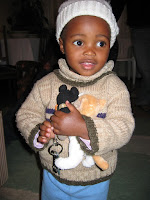
members. Johanna, who visits these “grannies” and many of the orphaned children, says the grannies are ill-equipped to help kids with homework or to teach them about things like AIDS, saying no to drugs, how to stop abuse. I noted that in the US we talk about the stresses of my generation as the “sandwich generation” – we end up raising our children and taking care of our parents as they age. In Guguletu this generation doesn’t exist. So there is no one to take care of the grannies or the children, except each other. Johanna told us that it used to be that neighbors would take care of neighbors, and although much of that spirit still exists, people now lock their doors, don’t check on each other, steal from each other out of desperation. Little girl pictured here is Liso, who lives with her mother and grandmother. Sophia and Ingrid should recognize the stuffed kitty she is holding. Liso is 2 and cried when I left her house the first night I met her.

So what happens to these children? We heard about horrible things: young pregnancies (12 or 13 years old), joining gangs, rapes, drugs and alcohol. Kids in safer environments also grow up very quickly: they know how to cook, do laundry (by hand, remember), take care of the younger kids. Top this off with learning several languages (native plus English and sometimes Afrikaans), “maths,” arts, history and an early program of how to take care of themselves when it comes to sex, abuse, and avoiding drugs. The kids in the picture here are from the afterschool program we helped out with. More on that later...
But one thing they don’t learn, we were told, is self-esteem. Nobody tells them they have value. They don’t do “Magnificent Me” books like Ingrid just finished in 3rd grade at the same time I was learning that these kids have no sense of who they are and what they are capable of. Many did express to us their dreams, however: to go to University and become a doctor or lawyer or actor. Education is clearly the key to getting them out of this situation, but education has its problems and expenses too (see upcoming blog about that!).
We met lots of people who work with the children, as educators and social workers mostly. How they continue on in their day to day work is unfathomable. We asked one woman, Weizewe, how she managed not to burn out and she said she gets restless and moves on to a new project in order to keep creative. She mentioned that working with government programs has really been dragging since they move so slowly and the task is so huge (but to the government’s credit, they have lots of programs to try to help the kids). Her new project is to work with “carers” (anyone who takes care of children, be they day care providers or grannies) to give them training in all that social workers can cover, plus health and nutrition and providing them with a chance to “off-load” their stresses.

And the orphans. So many, many orphans. We didn’t see anything along the lines of an orphanage (an institution or building where orphans stay) but met many people who took in orphans. One of these people is Priscilla, who took in 12 orphans (some pictured at left). Students on this trip last year met her as well, and were so moved by her generosity and kindness that they raised over $8000 to help her. We were honored to be able to tell her that the bedrooms of her house would be renovated with the money they raised. I am not sure she fully understood this, but the construction should start on Monday and I hope to go back Thursday to take pictures of the progress. Jessica on our trip is staying in Cape Town into July so she hopes to come back and take pictures of the completed project. Amazing work, U of M students. Special thanks to Kate and Brian for making sure the money got there in time for us to help you present it. (More on how the money is being spent coming from David.)
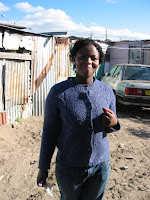
And the last story I want to tell is about Noluyolo, an 18 year old orphan who alone raises her 13 year old brother in a shack and has for something like five years (pictured left). She herself has not finished school as she didn’t pass her 12th grade year (can you imagine what distracted her??). She hopes to go to University someday to become a social worker (can you imagine what inspired her). We asked if her brother is giving her a hard time, being a teenager and all. She said he was, and has started to ask why they don’t have things that some of their friends have, and she’s trying to explain the economics of not having parents, not having a job, not having money, but staying in school and getting help from the community. Knowing how hard it is to explain the ways of the world to a child is, I really took this hard. The weight on her shoulders, the unfairness of the ways of their world…I stepped outside and cried here too.
To end this on an upbeat note, I will repeat that the children still showed great spirit and mischief and humor (and mostly, no shyness!). Children are still children, no matter where you go.



